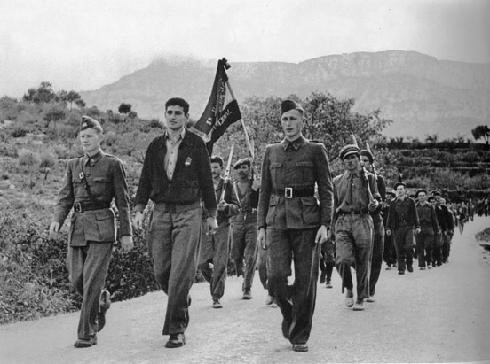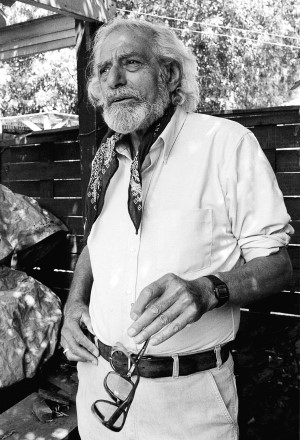
Biography
Wolff, Milton b. October 7 (8), 1915, Brooklyn, New York; Jewish; mother Celia Wolff; Attended the NY School of Commercial Art for a half a year; Civilian Conservation Corps; Single; Commercial Artist and Clerk; YCL April 1936, Spanish CP; Received Passport# 366339 on February 9, 1937 which listed his address as 1628 West 5th Street, and 74 Quentin Road, both Brooklyn, New York; Sailed February 20, 1937 aboard the Ile de France; Arrived in Spain on March 7, 1937; Served with the XV BDE, Washington BN, MG Co., Section 3, initially as a stretcher bearer then transferred to MG Co.; Promoted to Sargento August 20, 1937 with Lincoln-Washington BN, MG Co.; Promoted to Lincoln-Washington MG Co. Commander after Belchite; Promoted to Lincoln-Washington BN Commander at Teruel; Rank Captain, November 24, 1937; Served at Brunete, Quinto, Belchite, Fuentes de Ebro, Teruel, Segura de los Baños, and Ebro Offensive, promoted to Mayor August 28, 1938; Returned to the US on December 15, 1938 aboard the Paris; WWII recruited for the OSS and later joined the US Army; d. January 13, 2008, El Cerrito, California, buried at the foot of an unnamed hill, in Kensington, California.Sibling: brothers David Wolff, Harry Wolf, sisters Sahrah Wolff, Mary Wolff.
Sources: Sail; Scope of Soviet Activity; Cadre; Pay; Washington; RGASPI Fond 545, Opis 6, Delo 1015, ll. 13-39; ALBA 170 Milton Wolff Papers; ALBA PHOTO 170 Milton Wolff Photographs; Good Fight B, C, D and Z; Find-a-Grave# 57033316; (obituary) “Remembering Milt Wolff,” The Volunteer, Volume 25, No. 1, March 2008, pp. 1-2, 21-24; Wolff, Milton, Another Hill, University of Illinois Press, 2001; Member of the Working Class, Universe, inc, 2005. Code A
Excerpts from Milton Wolff's obituary: Born in Brooklyn on October 8, 1915, Wolff stood six feet two in bare feet and a few inches higher in the muddied brown boots he had picked up after swimming across the swollen Ebro River during the great retreats of 1938, just a few months before Hemingway wrote his profile. He had a loud, gravelly voice that was pure Brooklyn. Later, he claimed that was the reason he was picked to lead the Lincoln volunteers at the age of 22, but Wolff knew (he always knew but it embarrassed him) that he possessed a tremendous charisma that won the love of men and women throughout his life. And what all of them also knew was that Milton Wolff was a very intelligent man. He sailed for Spain in March 1937. Wolff recounted his experiences as a soldier in the autobiographical novel, Another Hill (1994). Moved by the enthusiasm of the other volunteers, he switched from a medical assignment to serve in a machine gun company in the newly formed Washington Battalion and went into action at Brunete in July 1937. Men inches away from him were wounded and killed, but he emerged without a nick. A few weeks later, while on leave in Madrid, his captain, Philip Detro from Texas steered him to the Cafe Chicote on the Gran Via. There he met Ernest Hemingway. The 21-year-old Wolff was not impressed. "Ernest is quite childish in many respects," he wrote to a friend in Brooklyn. "He wants very much to be a martyr. So much for writers," he concluded. "I'd much rather read their works than be with them." Within a month, Wolff was fighting on the Aragon front, leading a section of the machine gun company at Belchite and Quinto. By October, he commanded the machine gunners at Fuentes de Ebro. At Teruel, in January 1938, Wolff was a captain and an adjutant. Two months later, when a direct hit destroyed the battalion headquarters and killed the leadership, Wolff became the commander. He led the soldiers through the treacherous retreats, avoided capture, and wandered alone behind enemy lines until managing to swim across the Ebro. Wolff assumed responsibility for rebuilding the broken battalion. During the training period, Robert Capa, the legendary photographer, captured Wolff standing next to Hemingway, a visual contradiction: Hemingway, stocky, an adventurer in his half-opened zippered jacket; Wolff, lanky in uniform, a beret covering his thick, dark hair, but shy, hands in his pockets, face turned downward, impatient to get on with the war. A few weeks later, the photograph appeared in a New York Yiddish newspaper. To her surprise, Wolff's mother finally discovered what her absent son was doing in Spain. Not, as he had reported in his letters, working in a factory so that a Spanish worker could fight for the Republic, but leapfrogging through the military ranks. A "nobody at home," the soldier-poet Edwin Rolfe wrote about Wolff in his diary: "leader of men here." Wolff led the Lincolns back across the Ebro during the summer of 1938, held them in the lines of the violent Hill 666 in the Sierra Pandols, until ordered to turn over the battalion to Spanish officers as the government arranged for the withdrawal of foreign troops in 1938. In a ceremonial transfer of authority, Wolff was promoted to the rank of Major. After Spain, Wolff's iconic stature kept him at the forefront of the struggle to save the Spanish Republic, even after General Francisco Franco claimed military victory in 1939. He participated in street protests in New York, urging Washington officials to lift the embargo on shipments to Spain and to provide assistance for the Spanish refugees trapped in French concentration camps. When the French government threatened to deport these victims of war back to Franco's Spain, where many would face summary execution, Wolff joined other Lincoln veterans in demonstrations outside the French consulate in New York. He was arrested in 1940 for this activity and served fifteen days in jail. As the anti-Communist crusade abated in the 1960s, Wolff remained active in the U.S. Committee for a Democratic Spain, an organization that lobbied against U.S. treaties with the Franco regime, assisted the families of Franco's political prisoners, and advocated for political reform. Wolff also led the revitalized VALB in demonstrations against the Vietnam War. At one point, he wrote a personal letter to Ho Chi Minh offering the services of the Abraham Lincoln Brigade. He also advocated ending the trade embargo with Cuba and helped provide medical aid to a children's hospital in Havana. During the 1980s, Wolff and other veterans instituted a campaign to send ambulances to Nicaragua, an echo of U.S. domestic support for the Spanish Republic fifty years earlier. Invited frequently to return to Spain, Wolff was a beloved figure among Spaniards. In a recent visit, he won cheers when he reminded them that if they got into trouble in the future, "give me a call." - by Peter N. Carroll.
Biography: Milton (Milt) Wolff (1915-2008) was born in Brooklyn, NY to a working -class family. He left school at fifteen and worked in the New Deal 's Civilian Conservation Corps, 1933-1934. He later found work in a Manhattan garment factory and became politically active through membership in the Young Communist League. When the Civil War broke out in Spain, he responded to a YCL appeal for volunteers and sailed for Europe, aged 21, in March 1937. He initially served as a medic and then saw action in a machine-gun unit of the Washington Battalion in the Battle of Brunete in July 1937. The depleted U.S. forces were merged with the Lincoln battalion and Wolf rose quickly through the ranks. He led his unit at Belchite and in the unsuccessful assault at Fuentes del Ebro. He was promoted to captain during the battle of Teruel in January 1938. As the Loyalist forces retreated across the Ebro, and regrouped for a final offensive, Wolff, aged 22, became commander of the Lincoln Battalion. Wolff met Ernest Hemingway while on leave after Brunete, and forged with him an intense, lasting, and sometimes contentious friendship. Hemingway once described Wolff as being "as brave and as good a soldier as any that commanded battalions at Gettysburg." On his return from Spain Wolff immediately became active in organizing support for Loyalist refugees and opposition to the Franco regime. He served as National Commander of the Veterans of the Abraham Lincoln Brigade (1939-41 and 1942-54) and worked closely over many years with the Joint Anti-Fascist Refugee Committee, the Action Committee to Free Spain Now, the U.S. Committee for a Democratic Spain, the Civil Rights Congress, and the Smith Trials Bail Fund. He campaigned for the integration of the Brooklyn Dodgers, organized aid to Cuba, demonstrated against the Vietnam War, and joined with other Lincoln veterans to send ambulances to Nicaragua. During World War II he worked with the British Special Services before the U.S. entry into the War. He volunteered as a private in the U.S. Army infantry in June 1942 and saw action in Burma, served under General "Wild Bill" Donovan in the OSS building an intelligence network with Communist partisans in Italy, was a liaison to the Spanish Maquis in southern France, and served in India. He received a field commission as a lieutenant in Burma. After the War he found a variety of jobs, and developed his talents as a writer, painter, and photographer. Among his published works are many articles in the Daily Worker, the New Masses, and other left periodicals, and an autobiographical novel, Another Hill (1994), and a volume of memoirs, Member of the Working Class (2005). ~Courtesy Tamiment Library, NYU.
Photograph: Donald Thayer, Milton Wolff and George Watt lead the Lincoln-Washington Battalion. ALBA/VALB.; Milton Wolff, by Richard Bermack.
